
Methods in Ecology and Evolution
Scope & Guideline
Advancing ecological insights through innovative methodologies.
Introduction
Aims and Scopes
- Methodological Innovation:
The journal promotes new methodologies that advance ecological and evolutionary research, particularly those that utilize computational tools, statistical models, and experimental designs. - Interdisciplinary Approaches:
Research published in the journal often intersects with other fields such as data science, remote sensing, and computational biology, reflecting the multidisciplinary nature of modern ecological and evolutionary studies. - Focus on Data-Driven Research:
A significant emphasis is placed on data collection, analysis, and interpretation, including the use of big data and machine learning techniques to understand ecological patterns and processes. - Application of Theoretical Models:
The journal encourages the application of theoretical models to real-world ecological and evolutionary contexts, facilitating a deeper understanding of species interactions and ecosystem dynamics. - Conservation and Biodiversity:
Research that informs conservation strategies and enhances biodiversity understanding is a core focus, with methodologies aimed at improving ecological monitoring and management practices.
Trending and Emerging
- Machine Learning and AI Applications:
The integration of machine learning and artificial intelligence techniques for data analysis, species identification, and ecological modeling is rapidly increasing, showcasing the potential of these technologies in ecological research. - Remote Sensing and UAV Technologies:
There is a marked rise in the use of remote sensing and unmanned aerial vehicles (UAVs) for ecological monitoring, habitat assessment, and landscape analysis, reflecting advancements in technology and its applications in ecology. - Ecosystem Modeling and Simulation:
Research focusing on complex ecosystem modeling and simulations, including dynamic modeling approaches and agent-based models, is gaining traction as ecologists seek to understand intricate ecological interactions and dynamics. - Citizen Science and Participatory Approaches:
The involvement of citizen science in ecological research is on the rise, with methodologies that leverage community engagement for data collection and monitoring, enhancing the scope and scale of ecological studies. - Functional Ecology and Trait-Based Approaches:
An increasing emphasis on functional ecology, particularly trait-based approaches to understand species interactions and ecosystem functioning, is evident in recent publications.
Declining or Waning
- Traditional Statistical Methods:
There is a noticeable decline in the publication of papers relying solely on traditional statistical methods, as the field shifts towards more innovative and computational approaches. - Basic Descriptive Ecology:
Research focused primarily on basic descriptive studies of ecological phenomena is waning, with a greater emphasis now placed on hypothesis-driven research and advanced modeling. - Single-Species Studies:
Studies that focus exclusively on single-species analyses are becoming less common, with a trend towards multi-species and community-level investigations that better reflect ecological interactions.
Similar Journals

ECOLOGY LETTERS
Exploring the depths of ecological science for a sustainable tomorrow.ECOLOGY LETTERS, published by Wiley, is a premier journal dedicated to advancing the field of ecology and related disciplines. Renowned for its rigorous peer-review process and impactful research contributions, the journal boasts an impressive Scopus Rank of #13 out of 721 in the category of Agricultural and Biological Sciences, positioning it in the 98th percentile globally. With a Q1 rating in the 2023 quartile rankings for Ecology, Evolution, Behavior and Systematics, it serves as an essential platform for ecologists and evolutionary biologists to disseminate cutting-edge research findings from 1998 to 2024. Although not an open-access journal, ECOLOGY LETTERS actively contributes to the global ecology discourse, making it a critical resource for researchers, professionals, and students dedicated to understanding complex ecological interactions and evolutionary processes.
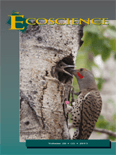
ECOSCIENCE
Advancing ecological knowledge for a sustainable future.ECOSCIENCE, published by Taylor & Francis Inc, stands as a prominent journal in the fields of Ecology and Environmental Science, recognized for its commitment to advancing knowledge since its inception in 1994. With an ISSN of 1195-6860 and an E-ISSN of 2376-7626, the journal caters to a diverse audience of researchers, professionals, and students passionate about ecological and environmental issues. In 2023, it achieved Q2 and Q3 rankings in the Scopus category of Ecology and Evolution, Behavior and Systematics, reflecting its significance within the academic community. Moreover, ECOSCIENCE occupies notable positions in Scopus rankings, including Rank #324 in Agricultural and Biological Sciences and Rank #210 in Environmental Science, symbolizing its role as a catalyst for disseminating high-quality research. Although currently not open access, the journal's multifaceted scope encourages in-depth discussions on ecological diversity, conservation strategies, and sustainable practices, making it an invaluable resource for those engaged in ecological research and practice.
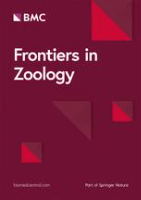
Frontiers in Zoology
Pioneering discoveries in animal behavior and systematics.Frontiers in Zoology is a premier, open-access journal published by BMC that has been a cornerstone of zoological research since its inception in 2004. With a commitment to advancing the field, this journal covers a broad spectrum of topics within Animal Science and Zoology, as well as Ecology, Evolution, Behavior, and Systematics. Recognized for its quality, it holds a distinguished Q1 ranking in both of these categories and ranks within the top percentiles in Scopus, with 87th and 78th percentiles, respectively. Based in the United Kingdom, it provides researchers, professionals, and students with innovative studies and findings that encourage interdisciplinary collaboration and exploration. The journal is dedicated to facilitating the open exchange of scientific knowledge, making it an essential resource for those seeking to stay at the forefront of zoological and ecological sciences.
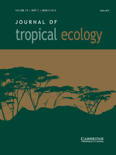
JOURNAL OF TROPICAL ECOLOGY
Fostering Conservation Through Empirical ResearchThe JOURNAL OF TROPICAL ECOLOGY, published by Cambridge University Press, serves as a pivotal platform for advancing knowledge in the field of ecology, particularly within tropical environments. With an ISSN of 0266-4674 and an E-ISSN of 1469-7831, this esteemed journal has been a key resource since its inception in 1985, maintaining a focus on empirical research that addresses the complexities of tropical ecosystems. It holds a respectable Q3 ranking in the Ecology, Evolution, Behavior and Systematics category as of 2023, indicating its significant contribution to the field, although it remains within the competitive mid-range. The journal publishes original research, reviews, and methodological articles that illuminate the rich biodiversity and unique ecological processes of tropical regions, fostering a deeper understanding of conservation challenges. Accessible from the United Kingdom, this publication appeals to a diverse audience of researchers, professionals, and students keen on exploring ecological dynamics in tropical settings, and plays a crucial role in promoting scientific discourse and collaborative efforts aimed at preserving our planet's vital ecosystems.
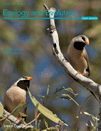
Ecology and Evolution
Pioneering discoveries that shape our understanding of biodiversity.Ecology and Evolution is a leading open-access journal published by WILEY, dedicated to advancing knowledge in the fields of ecology, evolution, and behavior. Since its inception in 2011, the journal has established itself as a critical platform, garnering a significant impact factor and maintaining a prestigious Q1 ranking in multiple categories, including Ecology, Evolution, Behavior and Systematics, and Nature and Landscape Conservation as of 2023. With its continuous commitment to high-quality research, Ecology and Evolution provides a vital conduit for dissemination among researchers, professionals, and students alike. The journal's open-access model ensures that groundbreaking findings are accessible to a global audience, fostering collaboration and innovation across various ecological and evolutionary disciplines. The editorial team invites submissions that explore the intricate relationships between organisms and their environments, aiming to inspire future research that addresses pressing environmental challenges. The journal's rigorous peer-review process guarantees the integrity and quality of published work, reinforcing its position as a frontrunner in its field.

ECOLOGICAL RESEARCH
Exploring the complexities of our ecosystems, one study at a time.ECOLOGICAL RESEARCH is a prestigious academic journal published by WILEY, dedicated to advancing the field of ecology and its associated disciplines. Since its inception in 1986, the journal has consistently provided a platform for high-quality, peer-reviewed research, contributing significantly to the understanding of ecological systems and their complexities. With an impressive 2023 impact factor reflected in its Q1 ranking in the category of Ecology, Evolution, Behavior, and Systematics, it stands among the top journals in its field, as evidenced by its Scopus rank of #192 out of 721 and placement in the 73rd percentile. While accessible through standard subscription models, this journal plays an essential role in disseminating crucial findings and innovative methodologies to researchers, professionals, and students alike. With a commitment to fostering ecological knowledge and collaboration, ECOLOGICAL RESEARCH continues to influence ecological practices and policies, shaping the future of research in this critical area.

RUSSIAN JOURNAL OF ECOLOGY
Unveiling Insights into Russia's Diverse EcosystemsRUSSIAN JOURNAL OF ECOLOGY, published by PLEIADES PUBLISHING INC, stands as a critical resource within the field of ecology, offering an array of research insights that span various ecological topics. With an ISSN of 1067-4136 and an E-ISSN of 1608-3334, this journal has been consistently disseminating knowledge since its inception in 1996, now converging towards 2024. Despite its current Q4 ranking in the Ecology, Evolution, Behavior and Systematics category, the journal has carved out a niche in the publication landscape, particularly for scholars focused on the rich and diverse ecological phenomena of Russia and surrounding territories. The journal aims to foster interdisciplinary collaboration and innovation by providing a platform for the dissemination of high-quality research. While it currently lacks open access options, readers can expect in-depth studies and analytical discourses that contribute meaningfully to the global understanding of ecological systems. With an impressive Scopus rank, this journal remains an important outlet for researchers, professionals, and students committed to advancing ecological science.

Nature Ecology & Evolution
Driving innovation in the study of behavior and systematics.Nature Ecology & Evolution is a premier journal that serves as a cornerstone for cutting-edge research in the dynamic fields of ecology, evolution, behavior, and systematics. Published by NATURE PORTFOLIO, this journal, with the ISSN 2397-334X, emphasizes high-quality, impactful studies that advance our understanding of ecological interactions and evolutionary processes. With an impressive Scopus ranking placing it in the 99th percentile—#6 out of 721 in Ecology, Evolution, Behavior and Systematics and #5 out of 461 in Environmental Science Ecology—it is classified as a Q1 journal, highlighting its significance in the research community. Established in 2016, it continues to foster an open dialogue among researchers and practitioners while facilitating the dissemination of transformative ideas that shape environmental policy and conservation strategies. While access to articles is restricted, the journal's robust impact factor underscores its relevance in scholarly discourse. Researchers, professionals, and students are encouraged to engage with the current trends and discoveries published in this leading journal, which thrives on addressing the challenges and complexities of our natural world.
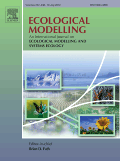
ECOLOGICAL MODELLING
Illuminating the intricate web of ecological interactions.ECOLOGICAL MODELLING, published by Elsevier, is a premier international journal dedicated to advancing the field of ecological modeling. Established in 1975, this reputable journal has consistently served as a vital platform for researchers, professionals, and students alike, reflecting the dynamic nature of ecological research and its applications. With an impressive impact factor, currently placing it in the Q2 quartile for Ecological Modeling and in the prestigious Q1 quartile for Ecology, ECOLOGICAL MODELLING ranks prominently in the scientific community, positioned at #91/461 in Environmental Science - Ecology and #14/41 in Environmental Science - Ecological Modeling according to Scopus rankings. The journal seeks to publish high-quality, interdisciplinary research that enhances understanding and predictive capacity regarding ecological processes and their integration into real-world applications. While the journal does not currently offer open access, it remains a cornerstone for knowledge dissemination within the ecological community, ensuring that your valuable research reaches a wide audience.

Molecular Ecology Resources
Fostering Excellence in Molecular Ecology ResearchMolecular Ecology Resources, published by WILEY, is a leading international journal that specializes in the intersection of molecular biology with ecology and evolution. With an impressive impact factor signified by its Q1 status in multiple categories, including Biotechnology, Ecology, Evolution, Behavior and Systematics, and Genetics for 2023, this journal stands as a reputable source of groundbreaking research within the fields of agricultural and biological sciences. Its Scopus rankings are particularly noteworthy, placing it in the top tier of its respective categories, demonstrating its significance in advancing our understanding of molecular ecology. The journal has been committed to fostering high-quality scientific discourse from 2008 to 2024 and offers open access options to enhance its visibility and accessibility. As a researcher, professional, or student in these dynamic fields, engaging with Molecular Ecology Resources means contributing to and staying informed about the latest innovations and methodologies that shape our understanding of the biological world.